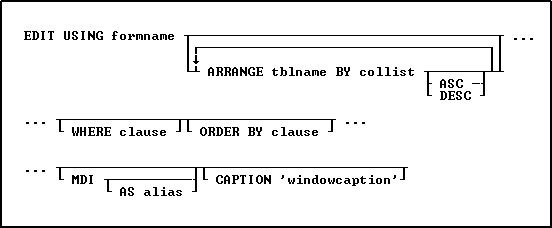Use the EDIT USING command to display a form with which to view, add, change, or delete data.

Options
formname
Specifies a form name. The form name is limited to 128 characters.
ARRANGE tblname BY collist
Sorts the rows displayed by a form's lower-level tables. Each lower-level table in the form that you want to sort requires its own ARRANGE clause. Now you can specify up to twenty-five tables to ARRANGE and up to five columns in each table on which R:BASE will sort.
ASC
DESC
Specifies whether to sort a column in ascending or descending order.
WHERE clause
Limits rows of data. For more information, see WHERE.
ORDER BY clause
Sorts rows of data. For more information, see ORDER BY.
This option is used in R:BASE for Windows only; specifies a modeless form-a modeless form allows you to access other windows without closing the form first.
AS alias
This option is used in R:BASE for Windows only. Allows the user to specify a name for this instance of the form. This option is used in conjunction with the MDI option so that the user can programmatically specify the form with the SETFOCUS command.
CAPTION 'windowcaption'
This option is used in R:BASE for Windows only. Specifies a caption for the window title bar.
Examples
EDIT USING formname CAPTION 'Form Caption'
EDIT USING formname MDI
About the EDIT USING Command
The EDIT USING command displays data in a previously created form. When the form was created, the user who created the form decided which database actions could be used on the form's tables. These database actions appear on the Forms menu.
In a multi-table form, the WHERE and ORDER BY clauses apply only to the first table in the form.
The EDIT USING command allows a form that includes a form called from an entry/exit procedure (EEP). The number of times a form can be invoked within another form is limited only by the amount of stack space available.
In R:BASE for Windows EDIT formname MDI AS alias can be used to start a form window that can later be accessed with a SETFOCUS command.
Notes:
•The EDIT USING command will display the data in a form based upon a multi-table View (a View based on multiple tables), but the data will not be editable.
•A View with a GROUP BY parameter is also not editable.
Examples
The following command displays the form named CustomerEdit with the rows from the first table, ordered by customer identification.
EDIT USING CustomerEdit ORDER BY CustID
The command below displays the form named CustomerEdit with the rows from the first table that have a customer identification number equal to 100.
EDIT USING CustomerEdit WHERE CustID = 100
The RRBYW20 database contains a five-table form called SalesTransactions. The command below shows how the form's four subordinate tables, InvoiceHeader, InvoiceDetail, Employee and Contact, can be sorted using an ARRANGE clause. The ARRANGE clause sorts the second table, InvoiceHeader, by the TransID column, in ascending order, sorts the third table, InvoiceDetail, by the DetailNum column, in ascending order, sorts the fourth table, Employee, by EmpLName and EmpFName, in ascending order and the fifth table, Contact, by the ContLName and ContFName, in ascending order.
CONNECT RRBYW20
EDIT USING SalesTransactions +
ARRANGE InvoiceHeader BY TransID ASC, +
ARRANGE InvoiceDetail BY DetailNum ASC, +
ARRANGE Employee BY EmpLName ASC, EmpFName ASC,+
ARRANGE Contact BY ContLName ASC, ContFName ASC +
ORDER BY CustID